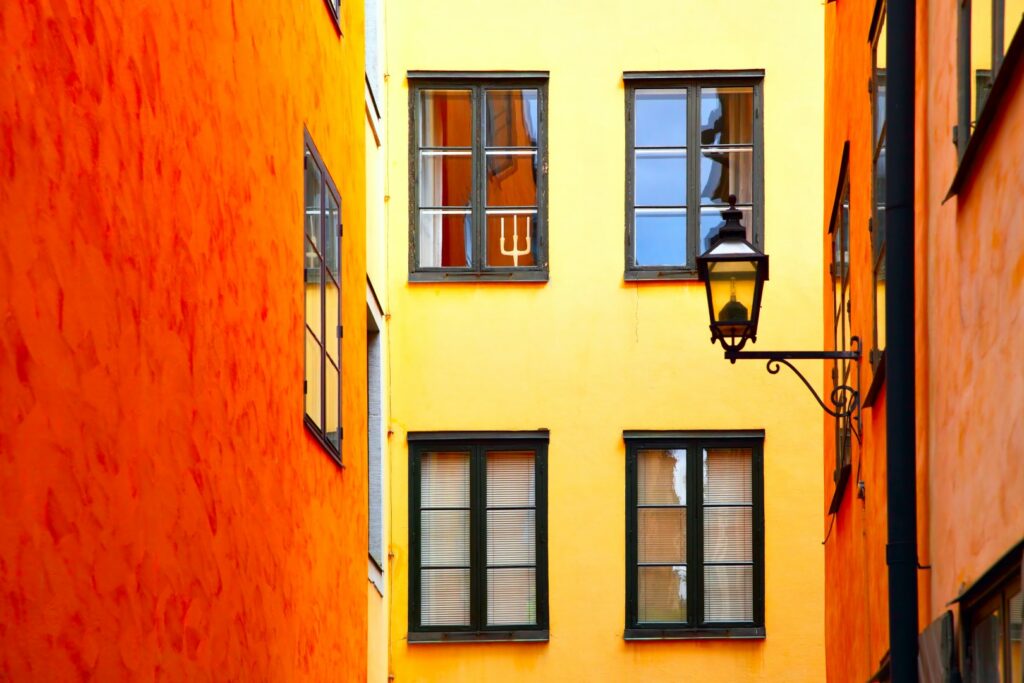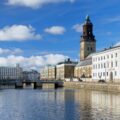‘God’s House’: Interfaith project thrives in Sweden
‘God’s House’: Interfaith project thrives in Sweden
We take a look at a small but vibrant interfaith community in Sweden. In ‘God’s House’, Muslims and Christians are united by faith as they heal divisions.
The quiet suburb of Fisksätra on the outskirts of Stockholm is not the obvious place for a thriving interfaith community. Three-quarters of Sweden’s population are ethnic Swedes.[1] Only about 20% of Swedes believe God plays an important role in their life.[2] And unlike other Nordic countries, Sweden doesn’t have a state Church.[3]
Against all odds, people of different faiths have built a home together, and have called it ‘God’s House’. How did this community come to be? What are its foundations? And what is its future?
A brief history of ‘God’s House’
Fisksätra is a relatively impoverished town by Swedish standards, and suffers from a range of social problems.[4] In recent years, it has been home to increasing numbers of immigrants, refugees, and people not native to Sweden. The town is also more religious than most in Sweden. Rough estimates have 40% of its population as Christian, 40% as Sunni Muslim, and 20% as other or nonreligious.[5]
As the diversity of Fisksätra increased, people of faith naturally started having conversations with each other. In a country that largely did not refer to God, they found their faith was a point of connection, especially when it came to ethical issues. In the case of Muslims and Christians, they shared stories and descent through the patriarch Abraham.[6]
The first formal expression of this growing relationship came in 2003, with an act of shared worship including both Muslims and Christians. Because no spaces existed to accommodate such an event, it was held outside, in the middle of a football field.[7]
A common concern
Fisksätra’s people of faith soon found common ground in their concern for people’s suffering. Christians and Muslims united in helping the hungry, homeless, or those lost in a strange country. Their services were particularly needed by undocumented refugees or immigrants having trouble with the authorities.[8]
Then in 2008, they became official, opening an interreligious hub called ‘The Source’. Three people were employed: a Muslim, a Catholic, and a member of the Evangelical Church of Sweden. This diversity was their strength. People found that their different backgrounds and skills made them far more helpful than other official agencies.
People came from not only Fisksätra, but from all over Stockholm, to seek their support. Demand soon outpaced the still small scale of The Source, which was operating out of basements and crumbling church halls.[9]
The construction of an interfaith house began in 2009. First came the parish hall, equipped with the modern facilities so desperately needed for the interfaith group’s activities. Then, next door an existing building was converted into a Christian church.[10]
Controversy and hatred touches God’s House
The final stage of the architectural vision for God’s House is yet to be completed. A mosque is being constructed out of the same material as the church. The two buildings will be linked via a stunning glass atrium, which will be a space where shared activities and worship can take place.[11]
The proposal for a mosque to be built in Fisksätra drew criticism from within Sweden and across Europe. It became the epicentre of right-wing nationalist movements who believed Islam had no place in Christian Sweden. Those involved with God’s House had to contend with sometimes violent Islamophobia, xenophobia, and racism.[12]
God’s House is being funded primarily through donations from the public, which indicates the degree of support their project enjoys. However, they are careful to specify that no donation can come with ‘political or other conditions’.[13]
Theological motivation
That God’s House became a magnet for intolerance and hatred runs completely against its founders’ intention. According to its website, ‘the work of God’s House is one of integration and inclusion and as such builds on religion as a resource in the community that can help heal the divisions in Swedish society’.[14]
God’s House is open about their understanding of God that drives their work. They have published a kind of bullet-point creed:
- we believe in one God, Creator of Heaven and Earth
- we believe that God is merciful, gracious and loving
- we believe that every human being is worth the same and has equal rights
- we believe that God calls upon us to love our fellow humans and protect all living things.[15]
This creed is general enough to be accepted by both Christians and Muslims. It makes a logical connection between God’s gracious creation of everything and our duty to treat one another with respect. The core values of God’s House centre around the Golden Rule – treat others as you would wish to be treated. It aims ‘to inspire trust and joy in cultural and religious diversity’.[16]
Its theology could even be compatible with Judaism. Jews are welcome to attend God’s House (as are people of any faith or none), but there is simply no demand in Fisksätra.[17] However, rabbis from Stockholm’s Jewish community are involved in the annual prayer for peace. God’s House often invites Jews to participate in festivals and even runs courses in Judaism.[18]
A union worth fighting for?
A critic might find certain weaknesses in the theology of God’s House. It makes the somewhat simplistic claim that Christianity and Islam believe in the same God ‘because we are [all] the children of Abraham’.[19] Can the differences between these two world religions really be completely ignored just because they share an ancestor? Or would it be better to highlight their different understandings of God, and discuss what makes each unique?
Indeed, God’s House claims that neither religion will be ‘mixed or watered down’.[20] It is all about respect and deepened mutual understanding. Its leadership actively sought out lessons from the mistakes and successes of other interfaith ventures around the world, including in the UK, Jordan, Germany, and India.[21]
To arrive at a point of mutual understanding in a world of suspicion and fear would be a true gift from God.
Interested in similar topics? Go to our Dashboard and get free updates.
Sources
[1] Sweden: Population statistics
[4] Henrik Larsson, ‘God’s House in Stockholm: Where people meet’, in Houses of Religions: Visions, Formats, Experiences, ed. Martin Rötting (Zürich: LIT Verlag, 2021), 105-6.
[5] Larsson, ‘God’s House in Stockholm’, 106.
[7] Larsson, ‘God’s House in Stockholm’, 106.
[8] Larsson, ‘God’s House in Stockholm’, 106-7.
[9] Larsson, ‘God’s House in Stockholm’, 108.
[10] Larsson, ‘God’s House in Stockholm’, 108.
[11] The Church Exists Today, We Will Build the Rest
[12] Larsson, ‘God’s House in Stockholm’, 115.
[13] God’s House: Frequently asked questions
[15] Directly quoted from: Larsson, ‘God’s House in Stockholm’, 111.
[16] Core Values of God’s House
[17] God’s House: Frequently asked questions
[18] Larsson, ‘God’s House in Stockholm’, 116.
[19] God’s House: Frequently asked questions
[20] God’s House: Frequently asked questions
[21] Larsson, ‘God’s House in Stockholm’, 112-3






